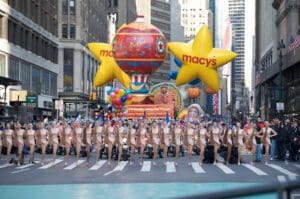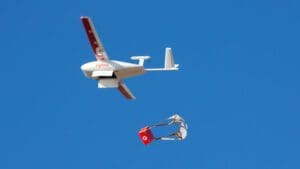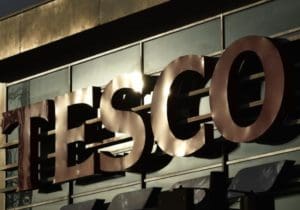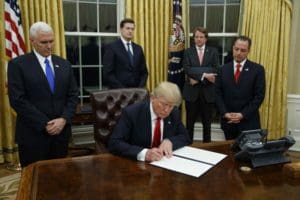 Over the last six-plus months, the coronavirus pandemic has changed virtually every aspect of our lives. We have dealt with the health implications of COVID as well as economic hardships, the closing of schools and businesses, delays and changes to our daily schedules, and a pivot in how many of us work, just to name a few. Outside of the core components of our lives, there have also been interruptions to the luxuries that we enjoy, such as sports, travel, festivals, and other sources of entertainment. With the holiday season rapidly approaching, I was thinking about one of the country’s biggest Thanksgiving events – the Macy’s Parade. I just read that the department store announced that it had to “reimagine” the upcoming 94th edition of the parade on November 26 and said it’ll be staged in a manner similar to its Fourth of July fireworks show. This year, rather than the normal event, parade events will be staged over two days, the overall number of participants will be reduced by approximately 75 percent and “all participants will be appropriately socially distanced.” The parade’s trademark massive balloons will still be in play this year, but without the traditional 80-100 handlers. Instead, Macys is employing a specially rigged anchor vehicle framework of five vehicles to fly the balloons. Needless to say, things will look different this year. And now on to this week’s logistics news.
Over the last six-plus months, the coronavirus pandemic has changed virtually every aspect of our lives. We have dealt with the health implications of COVID as well as economic hardships, the closing of schools and businesses, delays and changes to our daily schedules, and a pivot in how many of us work, just to name a few. Outside of the core components of our lives, there have also been interruptions to the luxuries that we enjoy, such as sports, travel, festivals, and other sources of entertainment. With the holiday season rapidly approaching, I was thinking about one of the country’s biggest Thanksgiving events – the Macy’s Parade. I just read that the department store announced that it had to “reimagine” the upcoming 94th edition of the parade on November 26 and said it’ll be staged in a manner similar to its Fourth of July fireworks show. This year, rather than the normal event, parade events will be staged over two days, the overall number of participants will be reduced by approximately 75 percent and “all participants will be appropriately socially distanced.” The parade’s trademark massive balloons will still be in play this year, but without the traditional 80-100 handlers. Instead, Macys is employing a specially rigged anchor vehicle framework of five vehicles to fly the balloons. Needless to say, things will look different this year. And now on to this week’s logistics news.
- Walmart partners with Zipline for drone deliveries
- Tesco will trial drone deliveries from October
- US blocks Chinese imports over alleged forced labor practices
- WTO says US tariffs on Chinese goods violated international trade rules
- Amazon to hire 100,000 logistics, fulfillment workers
- UPS holiday season hiring will top 100,000 amid e-commerce boom
- FedEx to hike tariff rates, surcharges in January
- EU ramps up no-deal preparations as it weighs UK’s Brexit ultimatum
 As I mentioned last week, Walmart is launching a small pilot program for drone deliveries in Fayetteville, NC, partnering with Flytrex. And now, the retail giant is at it again. Walmart announced earlier this week that it is partnering with Zipline to launch a delivery service of select health and wellness products in the US. Zipline is most known for launching a drone delivery service for medical supplies in Rwanda, which it kicked off in 2016. Since then, it has partnered with Novant Health to deliver personal protective equipment and medical equipment in North Carolina. Trial deliveries will take place near Walmart’s headquarters in Northwest Arkansas using Zipline’s technology and are expected to begin in early 2021. According to the partnership, Zipline will operate from a Walmart store and can service a 50-mile radius.
As I mentioned last week, Walmart is launching a small pilot program for drone deliveries in Fayetteville, NC, partnering with Flytrex. And now, the retail giant is at it again. Walmart announced earlier this week that it is partnering with Zipline to launch a delivery service of select health and wellness products in the US. Zipline is most known for launching a drone delivery service for medical supplies in Rwanda, which it kicked off in 2016. Since then, it has partnered with Novant Health to deliver personal protective equipment and medical equipment in North Carolina. Trial deliveries will take place near Walmart’s headquarters in Northwest Arkansas using Zipline’s technology and are expected to begin in early 2021. According to the partnership, Zipline will operate from a Walmart store and can service a 50-mile radius.
 Across the pond, Tesco, the UK’s largest retailer, is also looking into drone deliveries. The company announced that it would begin trialing home delivery of grocery items next month. For the trial, Tesco will make drone deliveries in Ireland, partnering with Manna, which is already licensed to operate in Ireland. Manna is a drone delivery as a service company that currently makes deliveries from restaurants and centralized kitchens to consumer’s homes. Its drones fly at an altitude of 80 meters and a speed of over 80kph, delivering within a 2km radius in less than 3 minutes. Tesco’s group innovation director Claire Lorains said the trial would initially focus on the delivery of just a few grocery items, such as forgotten recipe items, with deliveries made within 30 minutes to an hour of being processed.
Across the pond, Tesco, the UK’s largest retailer, is also looking into drone deliveries. The company announced that it would begin trialing home delivery of grocery items next month. For the trial, Tesco will make drone deliveries in Ireland, partnering with Manna, which is already licensed to operate in Ireland. Manna is a drone delivery as a service company that currently makes deliveries from restaurants and centralized kitchens to consumer’s homes. Its drones fly at an altitude of 80 meters and a speed of over 80kph, delivering within a 2km radius in less than 3 minutes. Tesco’s group innovation director Claire Lorains said the trial would initially focus on the delivery of just a few grocery items, such as forgotten recipe items, with deliveries made within 30 minutes to an hour of being processed.
 On Monday, the Trump administration banned the imports of cotton apparel and computer parts from companies and suppliers that allegedly relied on forced and imprisoned laborers in China’s Xinjiang region. In recent years, the US has condemned Chinese leaders in Beijing over alleged human rights violations, particularly citing forced labor against the Muslim minority population in Northwest China. US Customs and Border Protection officials issued orders for agents to hold shipments from four commercial entities, one training center, and an industrial park that they suspect have handled goods made with forced labor, citing the power of a “1930s law that declared the importation of those goods illegal.” China has continuously claimed that all operators in the region abide by international labor laws.
On Monday, the Trump administration banned the imports of cotton apparel and computer parts from companies and suppliers that allegedly relied on forced and imprisoned laborers in China’s Xinjiang region. In recent years, the US has condemned Chinese leaders in Beijing over alleged human rights violations, particularly citing forced labor against the Muslim minority population in Northwest China. US Customs and Border Protection officials issued orders for agents to hold shipments from four commercial entities, one training center, and an industrial park that they suspect have handled goods made with forced labor, citing the power of a “1930s law that declared the importation of those goods illegal.” China has continuously claimed that all operators in the region abide by international labor laws.
In other US – China trade news, the World Trade Organization (WTO) ruled that additional tariffs imposed in 2018 by the United States on Chinese goods violated international trading rules. A three-person panel of WTO trade experts said Washington broke with global regulations in 2018 when it slapped more than $200 billion in levies on a slew of Chinese goods. According to the panel, “the United States has not met its burden of demonstrating that the measures are provisionally justified.” The US has 60 days to appeal the decision under WTO rules.
 As it gears up for the holiday peak season, Amazon has announced that it will hire 100,000 full and part-time logistics and fulfillment workers in North America. The coronavirus pandemic and the surge in e-commerce orders has pushed Amazon and its competitors to the brink of delivery capacity, so it is now surprising to see the company getting a jump start on the shipping and delivery surge. Amazon said that hiring for the positions has already begun in the US and Canada. The minimum starting wage is $15 an hour, and in some markets the company said it is offering up to $1,000 in sign-on-bonuses. The company also said it will open 100 buildings this month across its fulfillment, sortation, and delivery network. Executives said on the company’s last earnings call that it will increase capacity by 50 percent by the start of the peak season to effectively manage the demand spikes.
As it gears up for the holiday peak season, Amazon has announced that it will hire 100,000 full and part-time logistics and fulfillment workers in North America. The coronavirus pandemic and the surge in e-commerce orders has pushed Amazon and its competitors to the brink of delivery capacity, so it is now surprising to see the company getting a jump start on the shipping and delivery surge. Amazon said that hiring for the positions has already begun in the US and Canada. The minimum starting wage is $15 an hour, and in some markets the company said it is offering up to $1,000 in sign-on-bonuses. The company also said it will open 100 buildings this month across its fulfillment, sortation, and delivery network. Executives said on the company’s last earnings call that it will increase capacity by 50 percent by the start of the peak season to effectively manage the demand spikes.
 UPS also said that it will hire more than 100,000 seasonal workers to help handle an expected surge of holiday packages from online orders this year as shoppers avoid stores as much as possible. This will be a slight increase over the number of seasonal workers the company hired last year. However, not included in this number are the 39,000 workers UPS hired in the second quarter due to a surge in package delivery demand. UPS is the only major courier with a unionized workforce, putting pay among the highest in the industry. Part-time package handlers earn US$14.50 an hour and seasonal drivers can make as much as US$21 an hour, the company said.
UPS also said that it will hire more than 100,000 seasonal workers to help handle an expected surge of holiday packages from online orders this year as shoppers avoid stores as much as possible. This will be a slight increase over the number of seasonal workers the company hired last year. However, not included in this number are the 39,000 workers UPS hired in the second quarter due to a surge in package delivery demand. UPS is the only major courier with a unionized workforce, putting pay among the highest in the industry. Part-time package handlers earn US$14.50 an hour and seasonal drivers can make as much as US$21 an hour, the company said.
 FedEx has announced it is raising tariffs rates and expanding surcharges in January. According to a statement from the company, it will raise its non-contract, or published, tariff rates by 4.9 percent to 5.9 percent on three of its four major product lines, effective January 4. The increases will apply to shipments tendered to the company’s FedEx Express air and international unit, the FedEx Ground and Home Delivery units, and its FedEx Freight less-than-truckload (LTL) operation. FedEx Freight’s increases will range between 4.9 percent and 5.9 percent on shipments between the US and Canada, Alaska, Hawaii, Puerto Rico, and the US Virgin Islands. On January 18, FedEx will introduce an additional-handling surcharge based on the dimensions of FedEx Express and FedEx Ground shipments. The surcharge will apply to all packages that measure more than 105 inches in length and girth.
FedEx has announced it is raising tariffs rates and expanding surcharges in January. According to a statement from the company, it will raise its non-contract, or published, tariff rates by 4.9 percent to 5.9 percent on three of its four major product lines, effective January 4. The increases will apply to shipments tendered to the company’s FedEx Express air and international unit, the FedEx Ground and Home Delivery units, and its FedEx Freight less-than-truckload (LTL) operation. FedEx Freight’s increases will range between 4.9 percent and 5.9 percent on shipments between the US and Canada, Alaska, Hawaii, Puerto Rico, and the US Virgin Islands. On January 18, FedEx will introduce an additional-handling surcharge based on the dimensions of FedEx Express and FedEx Ground shipments. The surcharge will apply to all packages that measure more than 105 inches in length and girth.
 The European Union (EU) is ramping up preparations for the end of the four-year Brexit negotiations. Late last week, Britain explicitly said this week that it plans to break international law by breaching parts of the Withdrawal Agreement treaty that is signed in January. The so-called “transition period” is set to expire at the end of December, but British Prime Minister Boris Johnson has plunged Brexit into crisis mode. The EU has ordered Britain to scrap the plan by the end of September, but Britain bluntly refused and said its parliament was sovereign above international law. This certainly sounds like an ugly end to a no-win situation.
The European Union (EU) is ramping up preparations for the end of the four-year Brexit negotiations. Late last week, Britain explicitly said this week that it plans to break international law by breaching parts of the Withdrawal Agreement treaty that is signed in January. The so-called “transition period” is set to expire at the end of December, but British Prime Minister Boris Johnson has plunged Brexit into crisis mode. The EU has ordered Britain to scrap the plan by the end of September, but Britain bluntly refused and said its parliament was sovereign above international law. This certainly sounds like an ugly end to a no-win situation.
That’s all for this week. Enjoy the weekend and the song of the week, Earl King’s Street Parade.

















